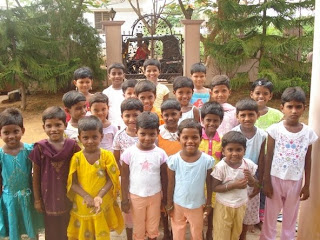 8 nouvelles petites filles sont arrivées le 18 mai dernier à l'orphelinat, ce qui porte les effectifs totaux de l'orphelinat à 22. Les nouvelles venues s'appellent Maremma, Lakshmi, Mouthamma, Shivalingamma, Jothi, Nagaveni, Basamma, Earamma.
8 nouvelles petites filles sont arrivées le 18 mai dernier à l'orphelinat, ce qui porte les effectifs totaux de l'orphelinat à 22. Les nouvelles venues s'appellent Maremma, Lakshmi, Mouthamma, Shivalingamma, Jothi, Nagaveni, Basamma, Earamma.A priori, il n'y aura pas de nouvelles venues prochainement. Pour le moment, les nouvelles observent avec vigilance leur nouvel environnement et comment les autres filles se comportent. Quelques filles ont beaucoup pleuré la première semaine, le temps de relâcher la tension liée au changement d'environnement. Les "anciennes" prennent le temps d'aider et de soutenir les nouvelles pour les guider dans leur nouvel environnement. Comme elles sont arrivées pendant les grandes vacances, cela a permis aux filles d'avoir un sas pour s'adapter à la vie "à la maison" avant d'attaquer à la rentrée, qui a lieu cette semaine!

Nous voulions en profiter pour vous rappeler l'histoire des filles.

 Cela signifie que toutes les filles ne sont pas orphelines. Mais toutes viennent de familles extrêmement pauvres, la plupart sont de castes intouchables, avec quelques musulmanes. Leurs histoires de vie sont assez complexes à chaque fois.
Cela signifie que toutes les filles ne sont pas orphelines. Mais toutes viennent de familles extrêmement pauvres, la plupart sont de castes intouchables, avec quelques musulmanes. Leurs histoires de vie sont assez complexes à chaque fois.
 Comme vous pouvez le voir, les nouvelles sont encore un peu "réservées", mais Prema est confiante en la capacité de l'équipe à les aider à s'épanouir progressivement...
Comme vous pouvez le voir, les nouvelles sont encore un peu "réservées", mais Prema est confiante en la capacité de l'équipe à les aider à s'épanouir progressivement...During the holidays, 8 little girls joined the orphanage which brings us to a total of 22 girls living at Ingrid NeaJaveena. The newcomers names are Maremma, Lakshmi, Mouthamma, Shivalingamma, Jothi, Nagaveni, Basamma, and Earamma.
They're not expecting any more admissions this year. Since they arrived, the girls have been observing their new environment and the behavior of the other girls. There have been some tears, because it is of course stressful to adjust to a new place. The "older girls" are keen on helping out, and try to provide support and guidance. Since they arrived during the "summer" holidays, the girls had some time to adjust to life around the house before going back to school, just last week.
We wanted to take this opportunity to tell you a bit more about their "life story."
Most of them are the daughters of devadasis ("sacred" prostitutes), and orphans. But not all of them. Others "simply" come from families with hardships, a mother who dies, for example, or an alcoholic and violent father. In this particular case, as the situation was getting worse, the villagers convinced the father to put his daughter in the care of the orphanage... the Director of the orphanage gave him some time to reflect, but in light of the fact that he made a clear decision when he was sober, it was possible for her to be admitted to the orphanage. In another case, the impoverished parents of a young girl found themselves in the terminal phase of AIDS, incredibly weak and no longer able to leave their home. They did not have the financial resources to feed their children, let alone themselves... and so they sought the help of the orphanage.
This means that not all the girls are orphans. But they all come from extremely poor families, in addition to being socially marginalized because of their caste (untouchables) or because they are Muslim. Each and every one has a complex life story, in which several layers of marginalization intersect: gender, profession, class, castes, religion, etc…
This also means that not all the girls are the daughters of devadasi. But the Director chooses to remain vague about the girls' backgrounds. This way, the girls will not risk being stigmatised, or worse, in light of the fact that the devadasi status is generally considered hereditary. It’s better that no one (besides the Director) knows who is who.